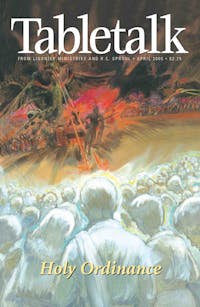
Request your free, three-month trial to Tabletalk magazine. You’ll receive the print issue monthly and gain immediate digital access to decades of archives. This trial is risk-free. No credit card required.
Try Tabletalk NowAlready receive Tabletalk magazine every month?
Verify your email address to gain unlimited access.
From the Mount of Olives, where Jesus ascended to heaven, the disciples went to a prayer meeting. They met in a familiar upstairs room in Jerusalem. All 11 apostles and the women who had been with Jesus were there.
They prayed in the name of Jesus Christ, who had disappeared in the clouds as they watched. Their prayer was addressed to the sovereign God, Master and Ruler. They knew that Jesus was at His right hand and would send His Spirit. He had charged them to “be witnesses to Me in Jerusalem, and in all Judea and Samaria, and to the end of the earth” (Acts 1:8). After Pentecost, thousands of believers devoted themselves to “the apostles’ doctrine and fellowship, … the breaking of bread, and … prayers” (Acts 2:42). The apostles taught Gospel doctrine in the setting of worship. They prayed in the temple courts, in the upper room, and in the homes of disciples.
The apostles were not sectarian. They continued to pray in Solomon’s Porch of the temple, worshiping the one true God through His incarnate Son (Acts 2:46; 3:1). They also met in other places in Jerusalem. Thousands of new believers crowded their praying assemblies. Houses in Jerusalem became places of prayer and worship where the Lord’s Supper was celebrated. Sharing of food and goods united the praying community.
They devoted themselves to prayer because they had devoted themselves to the Lord Jesus. They wanted to reflect Him, and they desired to serve Him. His resurrection and ascension lifted their praise to the Father’s throne. Luke gives us a taste of their prayer when Peter and John were released after they healed a lame beggar: “Lord, look on their threats, and grant to Your servants that with all boldness they may speak Your word, by stretching out Your hand to heal, and that signs and wonders may be done through the name of Your holy Servant Jesus” (Acts 4:29–30). They persevered in prayer because they knew that God heard them. They knew that God’s sovereign will had been accomplished at the Cross. Their prayer, like Peter’s preaching, had been transformed by their understanding of the Cross.
Apostolic prayer was kingdom prayer, addressed to the Creator and Sovereign of the world and its nations. The threats of the Sanhedrin against the apostles’ witness showed the futile rage of earthly rulers against the Sovereign God (Ps. 2; Acts 4:24–27). The apostles prayed for kingdom boldness, and the Lord answered their prayer in earthquake power (Acts 4:31). He filled them with His Spirit. They spoke the word with boldness: in the temple, before the Sanhedrin, and to the world. Signs and wonders attested the apostolic witness (2 Cor. 12:12).
Prayer continued to mark apostolic ministry. Burdened with administering relief for widows, the apostles declared they must not leave the ministry of the word and prayer to serve tables. They asked the church to choose seven men. They appointed them to lead this mercy ministry and ordained them in prayer.
Peter and the other apostles were called by Jesus to be the foundation of the church. He commissioned them to carry the Gospel to the world. When Philip, one of the seven, took the Gospel to Samaria, Peter and John came to recognize this work. With prayer and the laying on of their hands, the gift of the Spirit was given.
Prayer continued in the mission of the apostles. Peter opened the door of the Gospel to the Gentiles in the house of Cornelius, a praying Gentile believer. God had heard this Gentile’s prayers and cleansed him through faith. Later, when Peter was freed from prison by an angel, he knew where to find the Christians. They were praying in the house of Mary, the mother of John Mark.
The prophets and teaching elders at Antioch, meeting for fasting and prayer, were directed by the Holy Spirit to set apart Saul and Barnabas for the mission to which God had called them. After more fasting and prayer, they laid their hands on them and sent them off. As Paul established churches, he appointed elders, again with prayer and fasting.
Paul’s own ministry was centered in prayer, as we know from his epistles. To the Philippians Paul wrote, “I thank my God upon every remembrance of you, always in every prayer of mine making request for you all with joy” (Phil. 1:3). In countless trials, Paul’s refuge was prayer and praise. Paul and Silas, sitting in stocks at Philippi, ignored their bleeding backs. They sang God’s praises and prayed. An earthquake was the Lord’s response, freeing them and saving their jailer.
On the way to Jerusalem, Paul stopped to meet the gathered Ephesian elders. He knelt on the beach and prayed. He knew the warnings of prophets who foretold what suffering waited for him in Jerusalem, but his purpose, shaped in prayer, drove him on. In Jerusalem, Paul’s arrest by the Romans saved his life from a mob of Jews in the temple court. He appealed his case to Caesar, and was shipped to Rome—praying for his shipmates in the storm, and for those in Malta where the ship was wrecked.
Read Paul’s prayer in Ephesians 3:14–21 and hear him afresh as he knelt on the beach at Miletus with the Ephesian elders. You will see the intersection of Paul’s prayer life and his public ministry. The two are always bound together. Jesus was in large part the person He was because of His prayers. Paul was the same. As are we all.
